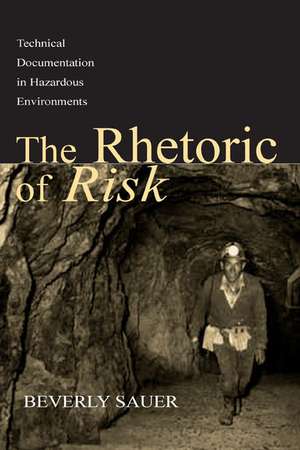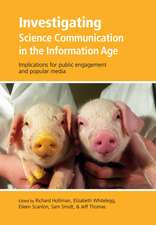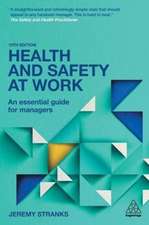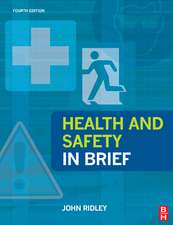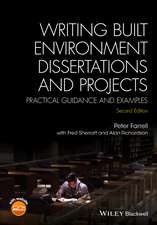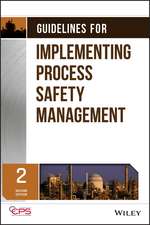The Rhetoric of Risk: Technical Documentation in Hazardous Environments: Rhetoric, Knowledge, and Society Series
Autor Beverly A. Saueren Limba Engleză Hardback – noi 2002
In The Rhetoric of Risk: Technical Documentation in Hazardous Environments, author Beverly Sauer examines how the dynamic uncertainty of the material environment affects communication in large regulatory industries. Sauer's analysis focuses specifically on mine safety, which provides a rich technical and historical context where problems of rhetorical agency, narrative, and the negotiation of meaning have visible and tragic outcomes. But the questions Sauer asks have larger implication for risk and safety: How does writing function in large regulatory industries? What can we learn from experience? Why is this experience so difficult to capture in writing? What information is lost when agencies rely on written documentation alone? Given the uncertainties, how can we work to improve communication in hazardous and uncertain environments?
By exploring how individuals make sense of the material, technical, and institutional indeterminancies of their work in speech and gesture, The Rhetoric of Risk helps communicators rethink their frequently unquestioned assumptions about workplace discourse and the role of writers in hazardous worksites. It is intended for scholars and students in technical writing and communication, rhetoric, risk analysis and risk communication, as well as a wide range of engineering and technical fields concerned with risk, safety, and uncertainty.
| Toate formatele și edițiile | Preț | Express |
|---|---|---|
| Paperback (1) | 460.32 lei 43-57 zile | |
| Taylor & Francis – noi 2002 | 460.32 lei 43-57 zile | |
| Hardback (1) | 1014.77 lei 43-57 zile | |
| Taylor & Francis – noi 2002 | 1014.77 lei 43-57 zile |
Preț: 1014.77 lei
Preț vechi: 1237.53 lei
-18% Nou
Puncte Express: 1522
Preț estimativ în valută:
194.17€ • 203.28$ • 160.67£
194.17€ • 203.28$ • 160.67£
Carte tipărită la comandă
Livrare economică 07-21 aprilie
Preluare comenzi: 021 569.72.76
Specificații
ISBN-13: 9780805836851
ISBN-10: 0805836853
Pagini: 384
Dimensiuni: 152 x 229 x 25 mm
Greutate: 0.87 kg
Ediția:New.
Editura: Taylor & Francis
Colecția Routledge
Seria Rhetoric, Knowledge, and Society Series
Locul publicării:Oxford, United Kingdom
ISBN-10: 0805836853
Pagini: 384
Dimensiuni: 152 x 229 x 25 mm
Greutate: 0.87 kg
Ediția:New.
Editura: Taylor & Francis
Colecția Routledge
Seria Rhetoric, Knowledge, and Society Series
Locul publicării:Oxford, United Kingdom
Public țintă
ProfessionalCuprins
Contents: Editor's Introduction. Introduction: The Rhetoric of Risk. Part I: The Problem of Technical Documentation in Hazardous Environments. Regulating Hazardous Environments: The Problem of Documentation. Moments of Transformation: The Cycle of Technical Documentation in Large Regulatory Industries. Acknowledging Uncertainty: Rethinking Rhetoric in a Hazardous Environment. Part II: Moments of Transformation. Reconstructing Experience: The Rhetorical Interface Between Agencies and Experience. Learning From Experience: Enlarging the Agency's Perspective in Training and Instruction. Warrants for Judgment: The Textual Representation of Embodied Sensory Experience. Part III : Documenting Experience. Embodied Experience: Representing Risk in Speech and Gesture. Manual Communication: The Negotiation of Meaning Embodied in Gesture. Part IV: Transforming Experience. Capturing Experience: The Moment of Transformation. Conclusion: The Last Canary?
Descriere
This volume examines rhetorical practices relating to situations of risk, and how documents and communication succeed or fail in these contexts. For scholars in technical communication, rhetoric, and related areas.
